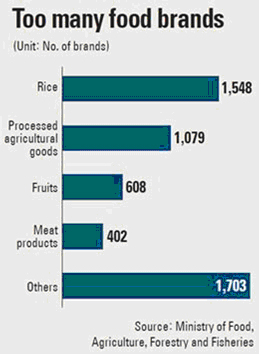
Market Information > 한국 농식품 시장뉴스
한국 농식품 시장뉴스
August 02, 2011
2011.08.02
1. BILATERAL/MULTILATERAL ISSUES
http://www.dt.co.kr/contents.html?article_no=2011080202010457731002
Summary: After the implementation of the FTA with EU on July 1, 2011,
http://english.yonhapnews.co.kr/business/2011/08/01/0502000000AEN20110801005400320.HTML
Summary:
One Month since Implementation of Korea-EU Free Trade Agreement …
http://news.donga.com/Economy/3/01/20110802/39239794/1
Summary: According to the Korea Customs Office, during the first month (July) since implementation of Korea-EU FTA,
2. ECONOMIC ISSUES
Prices up 4.7% despite gov’t efforts [English, CSY]
http://joongangdaily.joins.com/article/view.asp?aid=2939668
Summary:
“Last month, prices of fresh foods rose significantly due to the heavy rain,” said Yang Dong-hee, head of Statistics Korea’s price statistics department. According to the agency’s report,
How is core inflation driving up consumer prices in
http://english.donga.com/srv/service.php3?bicode=020000&biid=2011080248118
3. LIVESTOCK ISSUES
Farmers’ strike may lead to milk shortage [English, CSY]
'集乳 중단' 선언…우유대란 점점 현실로
http://joongangdaily.joins.com/article/view.asp?aid=2939678
Summary: The Korea Dairy and Beef Farmers Association announced yesterday that it will stage a one-day strike and stop providing 5,200 tons of milk to dairy companies tomorrow after price-hike talks failed Sunday. The association pledged to launch an indefinite strike if its request to raise the milk supply price from the current 704 won per liter ($2.53 per gallon) to 877 won isn’t accepted by Friday. “Foot-and-mouth disease and the rising cost of animal feed are making it increasingly difficult for farmers to eke out a living and the hike is unavoidable,” said an official at the Korea Dairy and Beef Farmers Association. The announcement came after the association’s request was rejected in a July 31 meeting with the Korea Dairy Industries Association and the Korea Dairy Committee.
4. MARKETING ISSUES
In agriculture,
Lots of fancy names and packaging but ignorance in building products
이름·포장지뿐인 농·축산 브랜드 5340개 난립

This indicates that farms and orchards are basically spending money for branding that just isn’t working. The main reason for the excessive number of brands is that each region’s agricultural and meat distribution centers create their own. According to research by the food ministry, each of the 912 rice processing complexes in the nation produced an average of 1.7 brands. Some sell 10 different brands.
Import Duty Removed on Banana, Pineapple, Cabbage, and Radish until September 30[Korean, OSY]
http://www.yonhapnews.co.kr/economy/2011/08/02/0301000000AKR20110802054300002.HTML?template=2087
Summary: Ministry of Finance and Planning announced on August 2 that import duties on banana, pineapple, cabbage, and radish will be removed temporarily until September 30. This measure is to help stabilize price of agricultural products in the market. In addition, existing duty reduction on processed pork meat (limited volume) will be expanded to all imports.
5. OTHER MISCELLANEOUS ISSUES
http://news.donga.com/Society/New/3/03/20110802/39240107/1
Summary: A total of 20 international cruise ships were accommodated in the
The information in this report was compiled by the Agricultural Trade Office (ATO) at the U.S. Embassy in Seoul, South Korea. The press summaries contained herein do NOT reflect USDA, the U.S. Embassy, or other U.S. government agency official policy or view point. U.S. food exporters can learn more about market opportunities in South Korea by reviewing ATO Seoul’s Exporter Guide and other reports available at www.fas.usda.gov by clicking on “attaché reports”.
Agricultural Trade Office, U.S. Embassy - Seoul
Tel: 82-2-6951-6848 Fax: 82-2-720-7921
Email: atoseoul@state.gov